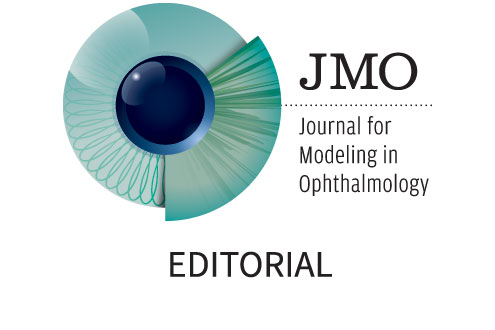Keywords
Abstract
At the ARVO annual meeting, there is an increasing number of contributions that involve significant mathematical modeling of ocular physiology and procedures. There has long been significant use of statistical methods for understanding data from a variety of in vivo measurements and clinical trials. Beyond these important uses of statistical and mathematical tools, a growing number of researchers are developing mathematical and computational models, often based on fundamental principles from physics, chemistry and mechanics, that provide insights into ocular phenomena. A number of areas had noticeable contributions involving applications of models, such as tear production, tear film dynamics, corneal biomechanics, retinal blood flow, and glaucoma. We list a number of such contributions in this introduction and follow those with five extended abstracts that summarize some of the studies mentioned here.
References
Guidoboni G, Salerni F, Repetto R, Szopos M, Harris A. Relationship between intraocular pressure, blood pressure and cerebrospinal fluid pressure: a theoretical approach. Invest Ophthalmol Vis Sci. 2018;59(9):1665.
Ishihara A. A simulation study of information transmission in OFF cone bipolar cell pathway. Invest Ophthalmol Vis Sci. 2018;59(9):1873.
Maki K, McManus A, Henshaw W, Braun R. The influence of tear supply and drainage on tear film dynamics during a realistic blink. Invest Ophthalmol Vis Sci. 2018;59(9):3817.
Yabusaki K, Arita R, Yamauchi T. Automated classification of dry eye type analyzing interfering fringe color images of tear film using machine learning technologies. Invest Ophthalmol Vis Sci. 2018;59(9):4860.
Cwiklik L, Riedlova K, Melcrova A, Olzynska A, Daull P, Garrigue J. Influence of benzylalkonium chloride on tear film lipid layer stability: a molecular level view by employing in silico modeling. Invest Ophthalmol Vis Sci. 2018;59(9):3279.
Zhong L, Antwi D, Braun R, King-Smith P, Begley C. Simulation and measurement of glob-driven tear film breakup. Invest Ophthalmol Vis Sci. 2018;59(9):4907.
Tavakol B, Birkenfeld J, Ramier A, Yun S-H. Development of a time-domain finite-element model of acoustic wave propagation in the cornea. Invest Ophthalmol Vis Sci. 2018;59(9):1401.
Missel P, Sarangapani R.Comparing the predicted efficacy of one versus two supraciliary micro-stents for lowering IOP in glaucoma patients using an ocular computational fluid dynamic model. Invest Ophthalmol Vis Sci. 2018;59(9):2057.
Jin Y,Wang X, Zhang L, Jonas J, Aung T, Schmetterer L, et al. Finite element modeling predicts neural tissue shear in the neuroretinal rim caused by pulsatile blood pressure. Invest Ophthalmol Vis Sci. 2018;59(9):2037.
Chuangsuwanich T, Leo L, Schmetterer L, Girard MJ. An hourglass pattern of oxygen distribution in the lamina cribrosa predicted using a computational model. Invest Ophthalmol Vis Sci. 2018;59(9):4477.
